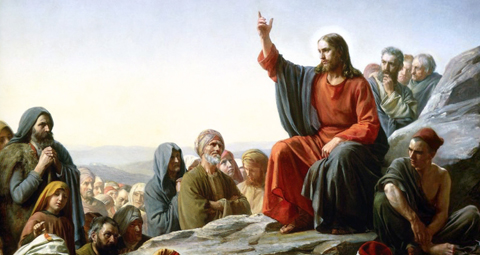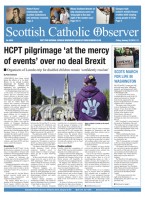January 27 | ![]() 0 COMMENTS
0 COMMENTS ![]() print
print

The 2,000 year-long sermon
THE BOW IN THE HEAVENS defends the ‘moral high ground’
By Fr John Bollan
Attentive readers of this column may remember that I was on holiday last week: but now it’s back to reality with a bang. Happily, the flight back last Saturday was a smooth one, with no delays or turbulence en route. The approach to Glasgow was interesting, however, being the first time I have landed in fog. At first I thought we were still waiting to break through the clouds, but then it became apparent that these clouds were in fact at ground level. I’m sure I wasn’t the only passenger to press my feet on an imaginary brake pedal as we landed. I imagine that everyone in a plane is a backseat driver. Whatever way you look at it, the ground rushing up to meet you is a good metaphor for the return to parish life after a break away.
Within moments of being picked up at the airport I had received a full briefing, from the good news (nobody missed me), to the bad (Roan, my nephew, had thrown up at the back of the Church at the Vigil Mass—there’s a bug doing the rounds, apparently), and all the bits in between. Thankfully, I didn’t have to attend to Roan’s contribution to the second collection: my chauffeur said he would take care of it and he did. His Benemerenti medal is in the post.
After an ecstatic welcome from Jasmine, my eye alighted on the pile of mail sitting on the table. Parishes tend to get a large quantity of post, much of it spam in the form of catalogues and brochures. Church communications and bills make up the rest. One of these (pictured right) refers to me as ‘Mr St Joseph’s Church Greenock.’
I’m not sure whether to take this as a complimentary title (as the most perfect specimen of priesthood in the parish, the competition not being all that tough) or a sign that my identity as an individual has basically been subsumed into that of the parish community. Either option is fine by me, to be honest.
Although I have returned to Church Unity Week, I haven’t seen much by way of ecumenical activity. I don’t know if there is a ‘clergy fraternal’ in these parts but, if there is, it’s passed me by. Relations with our local Church of Scotland Parish are conducted mostly by Twitter and Facebook where we ‘like’ each other a lot. In today’s society, that probably counts for quite a lot.
We had an appeal on behalf of the Apostleship of the Sea at all the Masses last weekend. That wasn’t just to ease me back into work mode—just a minute-long homily to preface the speaker’s remarks—but a token of how important this ministry is in this part of the world. My grandfather was a Tugboatman here on the Clyde and, although the volume of river traffic has declined, Greenock still remains an important port-of-call for both leisure and merchant ships. Our neighbouring parish, St Mary’s, could almost be regarded as the port church since a regular stream of passengers and crew drop in for Mass or light a candle while their ship is docked at the Ocean Terminal.
The volunteer from the Apostolate opened our eyes to the living and working conditions of those who are not free to get off the ship, who seldom get the chance to keep in touch with loved ones. Once again, the shadow of loneliness can fall on these men and women, even in the midst of bustling ships and frenetic activity. The appeal certainly struck a chord with the parishioners and reminded us of how much we take the way we get our ‘stuff’ for granted.
As I’m on call for the hospital this week, I’ve had to decline an invitation to a Burns’ Supper. As it happens, I’m very partial to a Burns’ Supper (and indeed to anything with ‘supper’ in it) and I’m generally sorry to be missing out on an evening of haggis, poetry and song.
In a sense, it’s fitting that Burns’ Night falls during the Octave of Prayer for Christian Unity because, although Burns himself was not an enthusiastic practitioner of the reformed religion and had little time for what he perceived as religious hypocrisy, he seems to have
held the Catholic Bishop John Geddes in high regard. Geddes certainly regarded Burns as something of a genius and tried to promote his poetry in ecclesiastical circles (although, one imagines, not the racier stuff produced by the Bard).
Burns and Geddes might be regarded as examples of ‘practical ecumenism’: one based not primarily on theological or spiritual rapprochement, but on simple friendship. Put simply, Burns liked the ‘Popish Bishop’ and Geddes liked the Ayrshire ploughman, whatever their differences in religion or their outlook on life, there was a genuine warmth between which confounded stereotypes and tribal attitudes. They were well-ahead of the curve when it came to mutual ‘likes.’
Of course, the ‘attitudes’ which inform our reflection this weekend are the ‘Be-attitudes’ of Matthew 5. The sermon on the mount gives a clear teaching that our happiness and eternal blessedness are dependent on our attitudes: not just our perspectives on life but attitudes also in the sense of the practical positions we take up with regard to justice, peace, respect for others (and ourselves for that matter). That’s the message we also take from the mountain top.
It’s a shame that the phrase ‘moral high ground’ has become so tainted. Whenever someone claims the moral high ground we can’t wait to see them lose it, to come a cropper and that’s usually because the moral high ground becomes a place where people exalt themselves and look down on everyone else.
It can be especially hazardous for preachers. That is emphatically not the way Jesus preaches. In today’s Gospel, he occupies the high ground but not in a way that exalts himself: he sits on the ground, the very model of that humility we hear about elsewhere in today’s readings. He’s on the high ground but he doesn’t talk down to anyone. In fact, the sermon on the mount is striking in the way it respects its hearers. What do I mean by that? What is a ‘disrespectful’ sermon? I think a disrespectful sermon either ignores the real lives of the people listening or else it tries to do too much, to give all the answers and leave no room for thought.
That’s why the Beatitudes are such homiletic dynamite: on the surface, they sound like slogans (and occasionally confusing sounding slogans at that). But what the Beatitudes are, deep down, is a kind of mirror into which each of us is asked to look. What does it mean to be a ‘peace-maker’ in my life? What does a ‘pure heart’ look like in me? How would that change the way I see the world, myself and other people?
Jesus doesn’t make it easy for us. He doesn’t tell us because there is no one answer. His words are hard work at times but that’s so good: the sermon on the mount (top) is the longest sermon in history—2,000 years and counting. But here we are, gathered on the slopes with Jesus on the high ground, listening.










